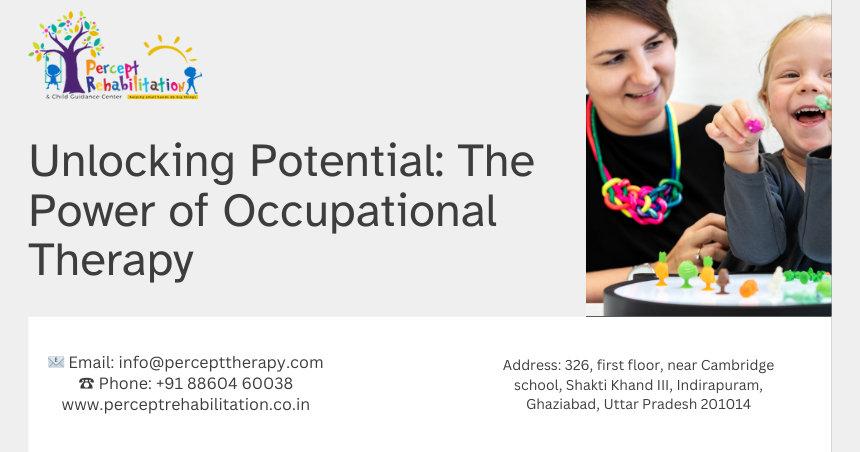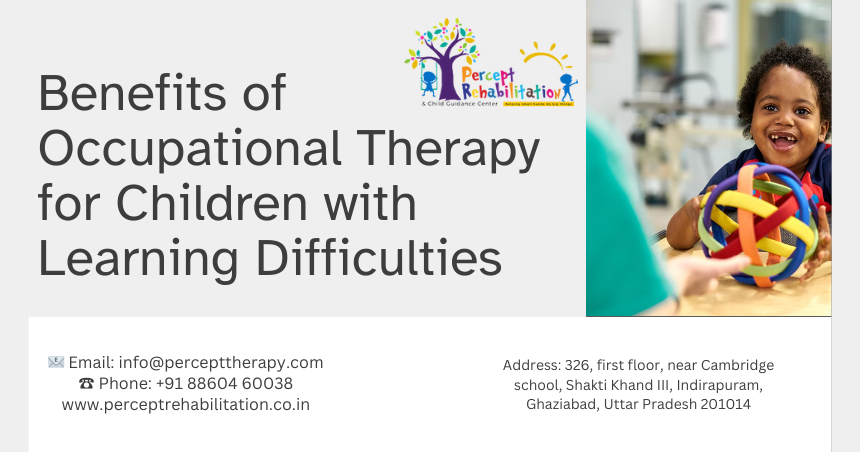Early childhood is a critical phase for physical, cognitive, emotional, and social growth. Each stage brings a new set of expectations known as developmental milestones—benchmarks that help gauge whether a child is progressing typically for their age. These milestones aren’t rigid rules but signals that can indicate if additional support is needed. At Percept Rehabilitation Centre, families often reach out to consult the best occupational therapist in Indirapuram when they feel something is amiss in their child’s development. Occupational therapy (OT) provides timely and essential intervention that can redirect a child’s path toward a more balanced and confident life.
What are Developmental Milestones?
Developmental milestones refer to a set of functional skills or age-specific tasks that most children can do within a certain age range. They are grouped across domains such as:
- Gross motor skills: walking, running, climbing
- Fine motor skills: grasping, drawing, writing
- Language and communication: speaking, understanding, responding
- Cognitive skills: problem-solving, memory, attention
- Social-emotional development: interacting with others, managing emotions
Delays in one or more areas may not always signify a disorder, but they are worth exploring further. Occupational therapy plays a vital role in evaluating these delays and formulating a child-centric strategy for progress.
Early Signs Your Child May Need Occupational Therapy
Recognizing the early signs of developmental delay empowers parents to take proactive steps. Occupational therapy offers intervention strategies that work best when implemented early. Some red flags may include:
- Difficulty holding objects or utensils
- Avoidance of eye contact or social interaction
- Frequent meltdowns or tantrums without apparent triggers
- Delay in walking, crawling, or standing
- Trouble grasping crayons or forming letters
- Poor balance or coordination
- Sensitivity to textures, sounds, or touch
Each of these signs could be an indicator that the child may benefit from a structured therapy program tailored to their individual needs.
The Role of Occupational Therapy in Child Development
Occupational therapy focuses on enabling children to achieve independence in their daily tasks. For children experiencing developmental delays, OT provides structured, play-based interventions that work on:
- Improving fine and gross motor coordination
- Enhancing cognitive processing
- Regulating sensory responses
- Building self-care abilities like feeding, dressing, and grooming
- Facilitating better communication and social interaction
OT doesn’t replace parental efforts but reinforces them with expert-driven plans that align with the child’s pace of growth.
Common Developmental Delays Addressed by OT
Occupational therapists are skilled at identifying and managing a wide range of developmental issues. Some commonly addressed challenges include:
1. Fine Motor Delay
Children with fine motor delays often struggle with tasks that involve small muscles, like holding a pencil or buttoning a shirt. OT can help develop grip strength, hand-eye coordination, and dexterity.
2. Gross Motor Challenges
Children may walk on their toes, have poor posture, or seem unsteady. Occupational therapy includes exercises that promote muscle tone, balance, and coordination.
3. Sensory Processing Issues
Oversensitivity or under-responsiveness to sensory stimuli can interfere with daily functioning. OTs create customized sensory diets to help children process stimuli more effectively.
4. Visual-Motor Integration Difficulties
These children may have trouble copying from a board or catching a ball. Therapy helps align visual input with physical movement, which is crucial for academic and play-based activities.
5. Delayed Self-Care Skills
Struggles with feeding, dressing, or toileting may signal delays. OTs use structured routines and adaptive strategies to build these life skills.
Key Developmental Milestones by Age
A general timeline can offer insights into what to expect at various stages. Here’s a basic breakdown of milestones:
By 6 Months
- Rolls over in both directions
- Begins to sit without support
- Responds to their name
- Begins babbling
By 1 Year
- Stands with support or begins to walk
- Picks up objects with thumb and forefinger
- Says simple words like “mama” or “dada”
- Enjoys peek-a-boo
By 2 Years
- Runs and climbs
- Begins using two-word phrases
- Can follow simple instructions
- Stacks blocks or turns pages
By 3 Years
- Jumps in place
- Uses 3–4 word sentences
- Copy simple shapes
- Begins cooperative play
If a child misses several milestones consistently, it’s worth considering a full OT evaluation.
The Evaluation Process in Occupational Therapy
The first step is a detailed developmental assessment. This includes:
- Parental input on behaviors and concerns
- Standardized testing using age-appropriate tools
- Observation of motor skills, attention, interaction, and sensory responses
- Goal setting based on the findings and parent feedback
Once evaluation is complete, the occupational therapist drafts a personalized intervention plan that outlines objectives, activities, and measurable outcomes.
How Therapy Sessions Are Structured?
Occupational therapy sessions are designed to be interactive and engaging. Each session typically includes:
- Warm-up activities to focus attention
- Targeted skill-building tasks (e.g., puzzles, obstacle courses, handwriting exercises)
- Sensory integration techniques (e.g., swinging, deep pressure, textured materials)
- Behavioral reinforcement through positive feedback
- Parental guidance on carry-over activities at home
Sessions are typically 45–60 minutes, conducted multiple times a week, depending on the child’s specific needs.
Involvement of Parents and Caregivers
A strong therapeutic outcome requires parent collaboration. OTs offer:
- Home programs with exercises that mirror clinical activities
- Feedback sessions to address challenges
- Workshops or handouts for awareness
- Parent-child joint activities to strengthen bonding and learning
Consistency between the clinic and home settings improves the likelihood of developmental gains.
Benefits of Early Occupational Therapy Intervention
Intervening early can significantly change developmental trajectories. Key benefits include:
- Improved motor coordination and handwriting
- Enhanced attention and task completion
- Better emotional regulation
- Increased independence in self-care
- Stronger peer interactions and confidence
When children are equipped with the right tools early, they are more likely to meet academic and social expectations with less stress.
The Link Between OT and School Readiness
School requires not only academic knowledge but also physical readiness. Occupational therapy prepares children for:
- Classroom routines like sitting still and following instructions
- Fine motor tasks such as cutting, coloring, and writing
- Social participation during group activities
- Emotional control to manage transitions and challenges
A child who enters school without these foundational skills may struggle despite high intelligence or verbal ability.
Red Flags Educators Should Watch For
Teachers and early childhood professionals are often the first to spot developmental concerns. Key signs to look out for:
- Difficulty holding a pencil or crayon
- Trouble following multistep directions
- Frequent fidgeting or inability to remain seated
- Poor social skills or emotional outbursts
- Avoidance of physical activity or group play
Collaborating with occupational therapists helps schools support children more effectively.
Addressing Sensory Challenges through OT
Some children may be oversensitive to touch, sound, or smell; others may seek excessive movement or pressure. OT addresses:
- Tactile defensiveness through brushing or play with various textures
- Auditory sensitivities using sound modulation strategies
- Vestibular challenges with swings, balance boards, and climbing
- Proprioceptive deficits using heavy work activities like pushing or pulling
These strategies help regulate the sensory system and improve daily functioning.
When Should Parents Seek OT Consultation?
Early consultation is key. Parents should consider occupational therapy if they notice:
- Regression or stagnation in skill development
- Difficulty adapting to routines
- Excessive sensory sensitivities
- Poor social interaction with peers
- Challenges in performing age-appropriate daily activities
A timely evaluation can prevent small issues from turning into larger ones.
Why Choose Percept Rehabilitation Centre?
At Percept Rehabilitation Centre, our focus is on empowering children to meet their full potential through a multidisciplinary and child-centric approach. We tailor every therapy plan after a detailed evaluation of the child’s strengths, areas of concern, and family priorities. Our environment is warm, safe, and structured to ensure that every child feels supported, respected, and motivated to grow. If you’re looking for guidance and care from the best occupational therapist in Indirapuram, our team is here to work hand-in-hand with your family.



